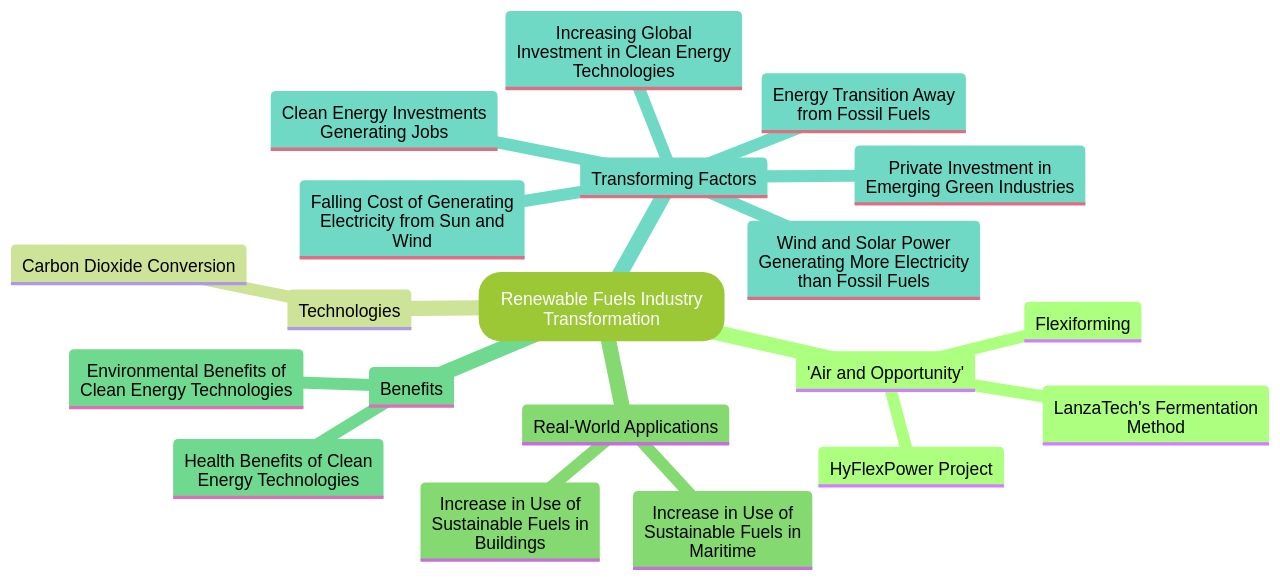Introduction
The renewable fuels industry is undergoing a rapid transformation, driven by the demand for sustainable alternatives to fossil fuels. In this article, we will explore the latest innovations and advancements in renewable fuel technologies.
From Unifuel.tech's flexiforming technology to the HyFlexPower project and LanzaTech's unique fermentation method, we will delve into the cutting-edge research and real-world applications that are shaping the industry. Furthermore, we will discuss the importance of air quality and how clean energy technologies can significantly reduce air pollution, benefiting both the environment and human health. Join us as we uncover the opportunities and advancements in the dynamic world of renewable fuels.
Understanding Renewable Fuel Innovation
The renewable fuels industry is witnessing a rapid transformation, driven by the need for sustainable alternatives to fossil fuels, and underpinned by the concept of 'Air and Opportunity'. This highlights the importance of air quality and the potential for growth within the sector. Within this dynamic landscape, innovative technologies such as Unifuel.tech's flexiforming are making a mark.
This technology offers operators the flexibility to determine their decarbonization speed, and can be deployed in an idle hydrotreater or reformer, leading to reduced capital expenditure and carbon intensity. Unifuel.tech, a Universal Fuel Technologies entity, ensures a swift response within 24 hours to inquiries, and offers assistance to customers to find the right application for flexiforming based on their feeds, target products, and existing facilities. Evidence of the sector's potential is also seen in real-world applications such as the HyFlexPower project, and LanzaTech's unique method of fermenting gases generated in steel production into ethanol.
Research advancements from institutions like the U.S. Department of Energy's Brookhaven National Laboratory and the University of North Carolina Chapel Hill, which focus on selective carbon dioxide conversion into methanol, driven by sunlight, further emphasize the progress in the field. Moreover, researchers from MIT and Harvard University have created an efficient process to convert carbon dioxide into formate, a stable, non-toxic, and non-flammable fuel source. By 2030, low-emission liquid fuels, led by biofuels, are expected to meet a large part of the energy demand in transportation and shipping.
Sustainable fuels such as methanol and renewable or synthetic natural gas are likely to see increased use in maritime and buildings. The health and environmental benefits of clean energy technologies are well-documented, with minimal harmful emissions and positive contributions to the health of individuals and the environment. Data from the International Renewable Energy Agency further underscores the growing capacity of renewable power generation, emphasizing the potential of renewable energy sources.

The Importance of Air Quality
The transformation of the renewable fuels sector is tightly linked to the quality of our atmosphere. By adopting these technologies, we can significantly reduce air pollution, enhancing air quality and providing notable benefits for environmental and human health. Take, for example, the implementation of Sustainable Aviation Fuel (SAF) at Copenhagen Airport.
The use of SAF has not only resulted in a decrease in CO2 emissions but has also improved the air quality. This demonstrates the additional advantages of SAF beyond its known capacity to reduce CO2 emissions. In another instance, the shutdown of a coal processing plant in the United States resulted in a quick reduction in air pollution and a 42% decrease in heart-related emergency room visits.
This highlights the potential health benefits that clean energy can provide. Sustainable Aviation Fuels, which can be derived from numerous sources, are being advocated as a solution to the aviation industry's carbon footprint. Thanks to the backing of new policies in the European Union and the U.S., the aviation industry now accounts for only 2% of global CO2 emissions.
Furthermore, 2019 data suggests that eliminating fossil fuels could prevent 80-85% of avoidable deaths from all human-induced sources of air pollution in South, South East, and East Asia, corresponding to around 3.85 million annually. In the realm of innovation, companies like Unifuel.tech are leading the way with technologies such as flexiforming. This technology enables operators to determine their rate of decarbonization and can be installed in an idle hydrotreater or reformer, thereby reducing both capital expenditure and carbon intensity.
Unifuel.tech, a subsidiary of Universal Fuel Technologies, is committed to responding to inquiries within 24 hours and offers customized solutions based on the operator's feeds, target products, and existing facilities. Hence, the future of renewable fuels is intrinsically linked to the air we breathe. Fully leveraging this potential presents significant opportunities for sustainable growth and innovation in the industry.

Opportunities for Advancement
The 'Air and Opportunity' perspective underscores the potential within the renewable fuels sector, due to technological evolution. This advancement fosters efficient renewable fuel production, ignites innovation, draws investments, and promotes cooperation.
HyFlexPower project is one notable example, which has put Power-to-Hydrogen-to-Power technology into practical use, predominantly at a Smurfit Kappa paper mill in France. This project has carved the path for industrial decarbonization by converting electricity from renewable energy into green hydrogen, which is then stored and transformed back into electricity, supplying industrial sites with electricity sourced from renewables like solar or wind.
Another notable stride in this sector is the partnership between ORLEN and Yokogawa, which focuses on an integrated management solution for synthetic fuel production. Their goal is to create a 'digital twin' of a production plant, refining the production processes.
The aim is to select the most economically feasible and environmentally sustainable synthesis method, which highlights the role of synthetic fuels in reducing industrial greenhouse gas emissions. Governmental policies and incentives are also being introduced to foster renewable fuel research and development.
For example, the Bioenergy Technologies Office of the US Department of Energy is leading research to address hurdles to the broad deployment of low-carbon sustainable aviation fuel. Europe, by promoting the use of biofuel through various policies and initiatives, has become the fastest-growing region in the biofuel market. In the same vein, Unifuel.tech offers a solution called 'flexiforming' that enables operators to control their decarbonization pace. This technology can be implemented in an idle hydrotreater or reformer, which reduces both capital expenditure and carbon intensity. Unifuel.tech's goal is to identify an optimal application for flexiforming based on the operator's feeds, target products, and existing facilities. All these advancements, along with governmental support and partnerships, are shaping a favorable environment for growth in the renewable fuels sector.
Conclusion
In conclusion, the renewable fuels industry is rapidly evolving to meet the demand for sustainable alternatives to fossil fuels. Innovations like Unifuel.tech's flexiforming technology offer flexible decarbonization options, reducing costs and carbon intensity.
Real-world applications such as the HyFlexPower project and LanzaTech's fermentation method demonstrate the sector's potential. Advancements in carbon dioxide conversion and efficient fuel production methods further drive progress in renewable fuel technologies.
The importance of air quality cannot be overstated. Clean energy technologies significantly reduce air pollution, benefiting both the environment and human health.
Examples like SAF implementation at Copenhagen Airport and coal plant shutdowns highlight improved air quality and associated health benefits. Opportunities for advancement in the renewable fuels sector are plentiful.
Projects like HyFlexPower and partnerships between companies like ORLEN and Yokogawa propel industrial decarbonization efforts. Governmental policies and initiatives, including support from the US Department of Energy's Bioenergy Technologies Office, foster research and development. In summary, the future of renewable fuels relies on improving air quality. By harnessing this potential, we can unlock opportunities for sustainable growth and innovation in the industry. With technological advancements, government backing, and strategic collaborations, the renewable fuels sector is poised for continued success.




